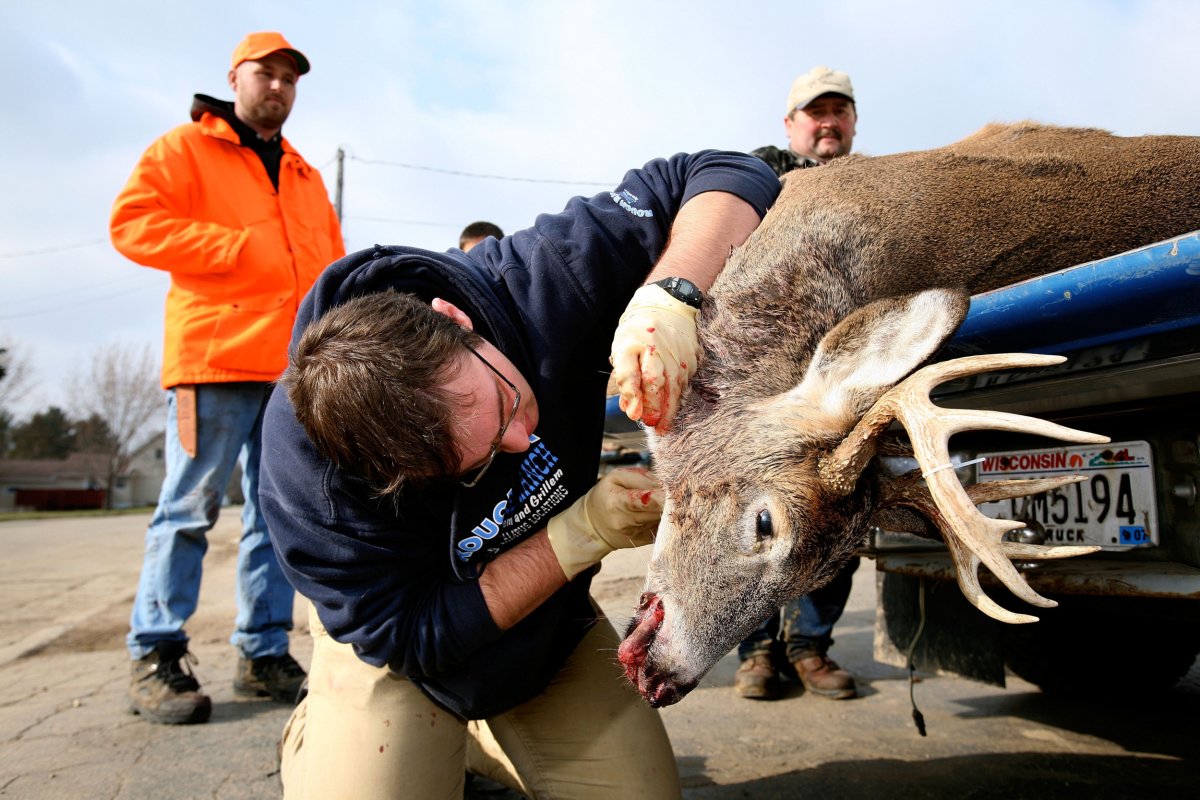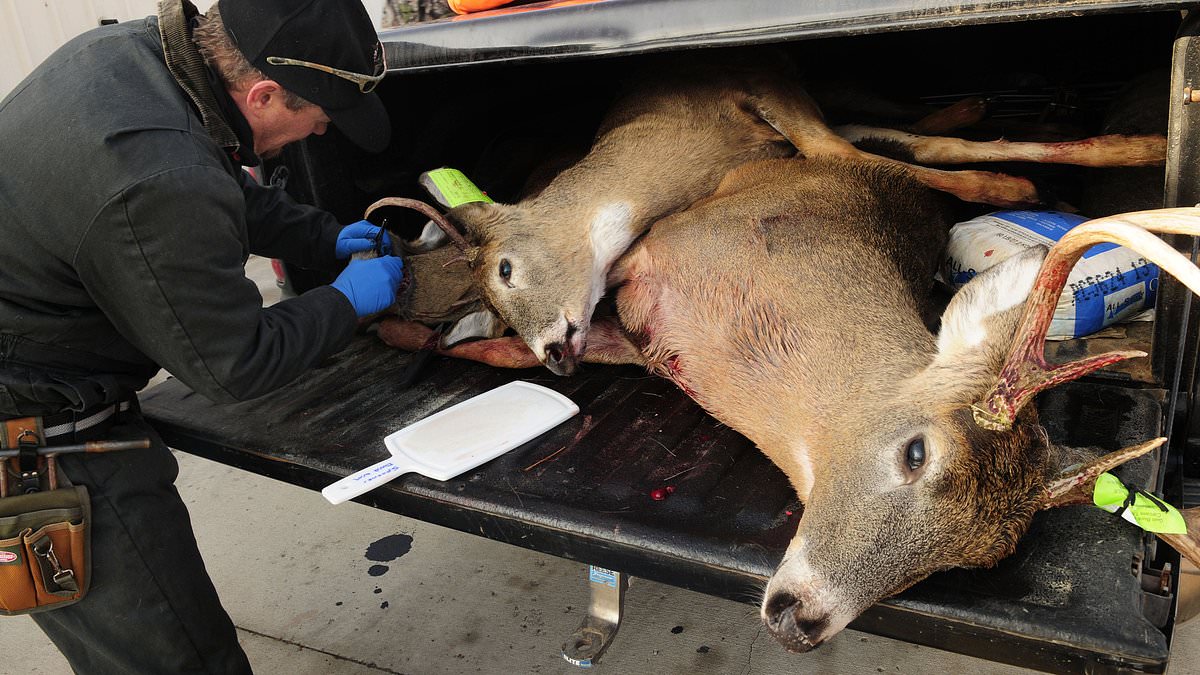Scientists Worry 'Zombie' Deer Disease May Spread To Humans
Scientists worry 'zombie' deer disease may spread to humans, as researchers issued a warning about the potential transmission of the virus following the discovery of the first-ever case in Yellowstone National Park last month.
Author:Camilo WoodReviewer:Dexter CookeDec 25, 20232.2K Shares245.4K Views

Scientists worry 'zombie' deer disease may spread to humans, as researchers issued a warning about the potential transmission of the virus following the discovery of the first-ever case in Yellowstone National Park last month.
Experts are concerned that this deadly brain virus, which is known to cause confusion, drooling, and a lack of fear of humans in infected animals, may also infect humans. The alert was sounded when a deer carcass in Yellowstone National Park tested positive for chronic wasting disease (CWD) in November, prompting Dr. Cory Anderson to state: "The BSE (mad cow) outbreak in Britain provided an example of how, overnight, things can get chaotic when a spillover event occurs, say, from livestock to people."
The virus has spread to over 31 US states, two Canadian provinces, and even South Korea in recent years, according to data from the US Geological Survey.
"We're talking about the potential of something similar occurring," said Anderson, the program co-director at the Center for Infectious Disease Research and Policy. "No one is saying that it's going to happen, but it's important for people to be prepared," he added.
Anderson, whose research delved into the pathways of chronic wasting disease (CWD) transmission, emphasizes that the illness is "inevitably fatal, incurable, and highly contagious."
“„Baked into the worry is that we don't have an effective, easy way to eradicate it, neither from the animals it infects nor the environment it contaminates.- Dr. Cory Anderson
CWD, a prion-transmitted disease akin to 'Mad Cow,' induces symptoms such as weight loss, coordination loss, and eventually fatal neurological issues in deer and related species. The US National Park Service asserted last month: "There is currently no evidence that CWD can infect humans or domestic animal species." However, the federal agency advised caution for game hunters, stating, "It is recommended that tissues from CWD-infected animals not be consumed."
The Wyoming Game and Fish Department's (WGFD) Wildlife Health Laboratory confirmed multiple positive tests for CWD in samples taken from the body of the infected mule deer. Standard testing procedures for both live and deceased animals include obtaining samples from the nervous system tissue, such as the spinal cord from the central nervous system, or peripheral systems like the retropharyngeal lymph nodes and tonsils.
Research conducted by the Centers for Disease Control and Prevention has indicated that the disease poses a risk to non-human primates, including monkeys.
"These studies raise concerns that there may also be a risk to people," the agency said. "Since 1997, the World Health Organization has recommended that it is important to keep the agents of all known prion diseases from entering the human food chain."
Yellowstone officials have announced a collaboration with the Wyoming Game and Fish Department (WGFD) to closely monitor the park's deer and other hoofed species, whether deceased or alive, to gain a more comprehensive understanding of the extent to which CWD has spread within the national park.
In response to the recent discovery, Yellowstone National Park authorities have initiated a revision of the park's 2021 CWD surveillance plan. A new version of the protocol is anticipated to be released sometime next year.
Yellowstone spokesperson Morgan Warthin has announced plans for increased collaboration between Yellowstone and the Wyoming Game and Fish Department (WGFD) to pinpoint areas within the park that are at a heightened risk of the disease.
Chronic wasting disease (CWD) was initially identified in mule deer in Wyoming's southeastern region in 1985. According to WGFD, Wyoming elk were also suffering from the fatal brain disease the following year.
The recent discovery of CWD in Yellowstone signifies the culmination of a westward spread across the state over decades, reaching the park's location in the northwest corner of Wyoming.
Wyoming game officials had been monitoring the mule deer buck from March 2023 until October 2023 when its GPS tag suggested its likely demise. The search for its carcass led them to a landmass known as the Promontory, situated between the south and southeastern arms of Yellowstone Lake. North of the park, wildlife regulators in Montana are actively contributing to the monitoring efforts and keeping a close watch on game captured by local hunters in their state.
Morgan Jacobsen, a spokesperson for Region 3 of Montana Fish, Wildlife & Parks, mentioned that as of now, many cases of Chronic Wasting Disease (CWD) have not been identified in the hunting districts of Montana that share borders with Yellowstone. Jacobsen characterized this information as a 'data point of interest,' clarifying that it would not significantly alter Montana's existing CWD surveillance plans.
Conclusion
"We're going to continue our monitoring and communication with the park and continue to work with hunters as the primary management tool for CWD in Montana," Jacobsen said.
Jump to

Camilo Wood
Author
Camilo Wood has over two decades of experience as a writer and journalist, specializing in finance and economics. With a degree in Economics and a background in financial research and analysis, Camilo brings a wealth of knowledge and expertise to his writing.
Throughout his career, Camilo has contributed to numerous publications, covering a wide range of topics such as global economic trends, investment strategies, and market analysis. His articles are recognized for their insightful analysis and clear explanations, making complex financial concepts accessible to readers.
Camilo's experience includes working in roles related to financial reporting, analysis, and commentary, allowing him to provide readers with accurate and trustworthy information. His dedication to journalistic integrity and commitment to delivering high-quality content make him a trusted voice in the fields of finance and journalism.

Dexter Cooke
Reviewer
Dexter Cooke is an economist, marketing strategist, and orthopedic surgeon with over 20 years of experience crafting compelling narratives that resonate worldwide.
He holds a Journalism degree from Columbia University, an Economics background from Yale University, and a medical degree with a postdoctoral fellowship in orthopedic medicine from the Medical University of South Carolina.
Dexter’s insights into media, economics, and marketing shine through his prolific contributions to respected publications and advisory roles for influential organizations.
As an orthopedic surgeon specializing in minimally invasive knee replacement surgery and laparoscopic procedures, Dexter prioritizes patient care above all.
Outside his professional pursuits, Dexter enjoys collecting vintage watches, studying ancient civilizations, learning about astronomy, and participating in charity runs.
Latest Articles
Popular Articles
